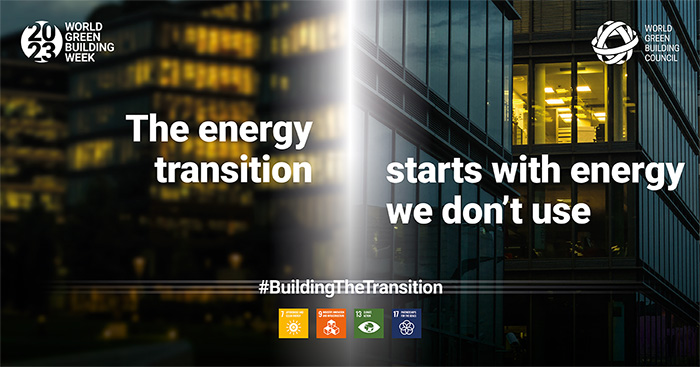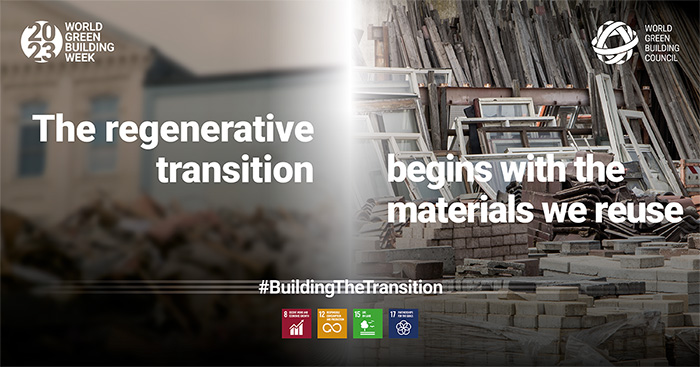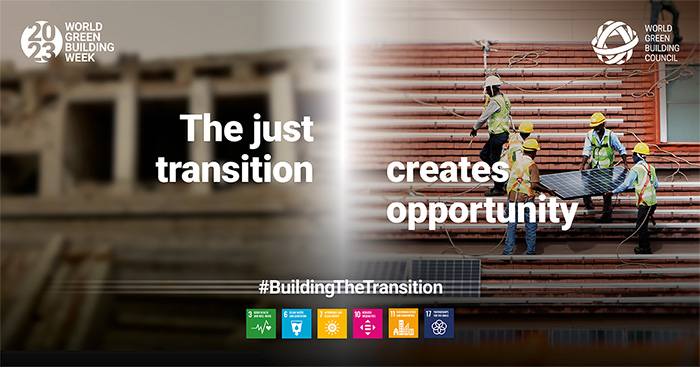The Time Is Now – WorldGBC Launches World Green Building Week To Strengthen The Transition To Sustainable Built Environments Ahead Of COP28

Led by World Green Building Council’s (WorldGBC) global network of over 75 Green Building Councils (GBCs) and their 46,000 members, the #BuildingTheTransition campaign is calling on the global building and construction sector to accelerate the transition to secure an energy efficient, regenerative and just future for all.
Now in its 15th year, the week‑long event will show how through systems change thinking, and leveraging local solutions, we can transition to sustainable built environments. It is a topic high on the political agenda – that amidst a tipping point in climate change, humanitarian challenges and economic uncertainties, the transition to a sustainable built environment must escalate now if we are to secure a sustainable future for all.
Against the backdrop of the world’s first Global Stocktake, global attention is shifting to the solutions that must be scaled to keep the Paris Agreement’s 1.5°C goal within reach.
There is no question that the transition required to regenerate and repair our planet will see systemic transformation across all sectors. As the largest contributing sector to global energy‑related carbon emissions (37% globally), the built environment is a key enabler of change in the transition to a decarbonised, sustainable and resilient society.
At the UN Climate Summit COP28 taking place in Dubai, UAE, (30th November – 12th December 2023), the world’s first Global Stocktake will result in a review of the collective goals agreed upon under the Paris Agreement, highlighting areas of progress and identifying key gaps before countries submit updated Nationally Determined Contributions (NDCs) in 2024. This is a pivotal moment for change as political and private sector leaders across the world ask “how far have we come?”, and importantly, “how far do we still have to go?” in order to tackle the worst impacts of global heating.
Throughout World Green Building Week (#WGBW23), WorldGBC’s network will host events across the world and share examples of #BuildingTheTransition across three themes: the energy transition, regenerative transition and just transition. This year’s campaign will also lead into the UN’s 2023 SDG Summit (18th – 19th September) and therefore pinpoint 11 of the 17 Sustainable Development Goals that are essential to catalyse a sustainable built environment.
#BuildingTheTransition’s three themes highlight how the built environment can support the Paris Agreement and the UN’s Sustainable Development Goals:
The Energy Transition

The energy transition is about more than switching to renewable energy. We’re talking about a complete systemic change. Accelerating the uptake of built environments that reduce energy demand, store and share clean energy, and produce more energy than they use. It’s investing in clean technologies and driving economies of scale. And it’s deep retrofitting existing buildings to be exceptionally energy efficient.
The Regenerative Transition

How do we advance regenerative principles in the built environment from niche to normal? Our planet’s resources give us life, but they are not infinite. Humans and the built environment must exist together within a cycle of natural systems. That means not just protecting biodiversity but prioritising its restoration, embracing nature‑based solutions, and creating a thriving circular economy across the entire building value chain.
The Just Transition

We cannot achieve climate justice without social justice. The people who have contributed the least to environmental degradation are suffering the biggest consequences. Equality is not the same as equity. Advancing a just transition in the built environment means committed solidarity to protect human rights from financial flows, to supply chains, to geopolitics.
Cristina Gamboa, CEO, World Green Building Council said: “The time for change is now. We have had a final reminder from this year’s Sixth Assessment Report from the Intergovernmental Panel on Climate Change (IPCC) that we must take urgent action if we are to prevent our being evicted by an uninhabitable planet. Yet while we may be running out of time, by no means are we running out of solutions. Those solutions are being pioneered around the world right now by our global network, as we advocate together for #BuildingTheTransition.
“From 11th – 15th September, our network is unified in leveraging localised solutions from across the built environment to accelerate a global transition to a decarbonised, sustainable and resilient society. The built environment is the largest contributing sector to global energy‑related carbon emissions – and therefore it is key to leveraging solutions to secure a sustainable future for all.
“To succeed, these solutions must be scaled up, and that’s why political and industry ambition is crucial. With COP28 in Dubai, UAE, and the world’s first Global Stocktake taking place this year, we are reminded always that 1.5ºC is a limit, not a target. That’s why, during this World Green Building Week, our #WGBW23 and #BuildingTheTransition campaign is inviting our global community, and leaders around the world, to take urgent action to accelerate the UN Sustainable Development Goals and transition to energy efficient, regenerative and just built environments for everyone, everywhere.”
Find out more and join the social media campaign at @WorldGBC, #BuildingTheTransition and #WGBW23.



























































